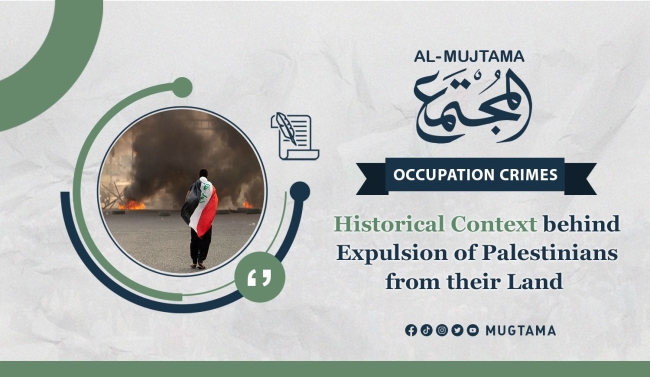Historical Context behind Expulsion of Palestinians from their Land
The expulsion of Palestinians from their land has a significant historical background that should not be overlooked. It is crucial to understand the context and events that led to this displacement to gain a deeper understanding of the current situation.
It is a complex and controversial topic that has been extensively studied and debated by scholars, historians, and policymakers. We aim here to provide an understanding of the underlying factors and historical context that led to the forced displacement of Palestinians from their homes. By analyzing various political, social, and economic aspects, we can gain a comprehensive perspective on this critical issue.
Historical Background
To comprehend the expulsion of Palestinians, it is crucial to understand the historical background of the region. The establishment of the Zionist entity in 1948 marked a turning point, fueled by the Zionist movement's aspirations for a Jewish homeland. The creation of the Zionist entity resulted in a series of conflicts, including the Arab-"Israeli" War, which played a significant role in the displacement of Palestinians.
Regional Power Dynamics
The expulsion of Palestinians was influenced by broader regional power dynamics during the mid-20th century. The involvement of neighboring Arab states, such as Egypt, Jordan, Syria, and Iraq, who were against the creation of the Zionist entity, intensified the conflicts in the region. Their political and military decisions had repercussions on Palestinian lives and contributed to the displacement of Palestinians from their lands.
Geographical Considerations
Geographical factors played a notable role in the displacement of Palestinians. The strategic significance of certain locations, such as Jerusalem, the West Bank, and Gaza Strip, sparked territorial disputes and conflicts. The "Israeli" government's policies, including the construction of settlements in these areas, further marginalized Palestinians and contributed to their expulsion from their lands.
International Involvement
International involvement in the Zionist-Palestinian conflict cannot be overlooked in examining the expulsion of Palestinians. External powers, particularly the United States, played a significant role in shaping the political landscape and, as a result, influenced the fate of Palestinian communities. Diplomatic support, funding, and military aid provided to Israel have had lasting impacts on Palestinian dispossession.
Zionist Policies and Actions
Zionist policies, such as land confiscation, house demolitions, and discriminatory laws, are key factors contributing to the expulsion of Palestinians. The implementation of policies like the Absentee Property Law and the Law of Return adversely affected Palestinians, diminishing their rights and leading to the loss of their lands.
Effects of War and Conflict
The recurrent wars and conflicts in the region have had dire consequences for Palestinians, resulting in their displacement from their lands. Zionist's military interventions in various conflicts, such as the Six-Day War in 1967 and the Gaza conflicts, have led to the destruction of Palestinian homes, infrastructure, and displacement of their communities.
Demographic Shifts
Demographic changes, including population growth and the influx of Jewish immigrants, have played a role in the expulsion of Palestinians. The United Nations' Partition Plan of 1947, which led to the establishment of "Israel", resulted in a massive influx of Jewish immigrants and subsequent population shifts, fostering tensions and displacement of Palestinians.
Social and Cultural Dynamics
The expulsion of Palestinians was also influenced by social and cultural dynamics. The clash of identities and narratives between Israelis and Palestinians has contributed to cycles of violence and animosity. These factors, coupled with the existence of nationalist movements on both sides, have contributed to the forced displacement of Palestinians from their ancestral lands.
Economic Factors
Economic factors, including land ownership, resources, and infrastructure development, have played a significant role in the displacement of Palestinians. The Zionist government's policies prioritizing Jewish settlements and economic growth have often ignored the rights and well-being of the Palestinian population, further exacerbating their expulsion.
In conclusion, the expulsion of Palestinians from their lands resulted from a combination of historical, political, social, and economic factors. Understanding the complex dynamics at play is essential for proposing viable solutions to address the plight of Palestinians and strive for a just and lasting resolution to the Israeli-Palestinian conflict.


